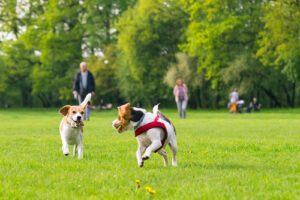Coccidia in dogs is a common intestinal parasite that can cause significant health issues, especially in puppies and immunocompromised dogs. Understanding coccidia in dogs, its symptoms, treatment options, and preventive measures can help you keep your pet healthy. If you suspect your dog has coccidia, call Broomfield Veterinary Hospital at (303) 466-1764 or book an appointment online.
Understanding Coccidia in Dogs
Coccidia are microscopic parasites that live in the intestinal lining of dogs. These parasites are protozoa, not worms, and they reproduce quickly, causing an infection called coccidiosis. Coccidia in dogs is most commonly caused by the species Isospora, but other species can also infect dogs. The infection is more prevalent in puppies due to their underdeveloped immune systems. Coccidia are usually ingested from contaminated environments, such as soil, water, or feces from an infected animal. Once inside the dog, the parasites invade the cells of the intestinal lining, leading to inflammation and damage.
Symptoms of Coccidia in Dogs
Recognizing the symptoms of coccidia in dogs is crucial for early diagnosis and treatment. Symptoms can vary depending on the severity of the infection and the dog’s overall health. Common signs include:
- Diarrhea
- Dehydration
- Lethargy
- Weight loss
- Loss of appetite
- Vomiting
If your dog shows any of these symptoms, contact Broomfield Veterinary Hospital at (303) 466-1764 or book an appointment online for a thorough examination.
Diagnosing Coccidia in Dogs
To diagnose coccidia in dogs, veterinarians typically perform a fecal flotation test. This test involves examining a sample of the dog’s stool under a microscope to detect the presence of coccidia oocysts (eggs). In some cases, multiple fecal samples may be needed to confirm the diagnosis, as the shedding of oocysts can be intermittent. Advanced diagnostic methods, such as polymerase chain reaction (PCR) testing, can also be used to identify the specific species of coccidia.
Treatment for Coccidia in Dogs
Treating coccidia in dogs involves eliminating the parasites and addressing the symptoms caused by the infection. The primary treatment options include:
- Antiprotozoal Medications: Veterinarians prescribe medications such as sulfadimethoxine or ponazuril to kill the coccidia parasites. The duration of treatment varies based on the severity of the infection and the dog’s response to the medication.
- Supportive Care: In cases of severe dehydration, dogs may require intravenous fluids to restore their hydration levels. Nutritional support and medications to manage diarrhea may also be necessary.
- Environmental Control: Since coccidia oocysts are shed in the feces and can survive in the environment, cleaning and disinfecting the dog’s living area is essential to prevent reinfection. Regularly removing feces from the yard and using appropriate disinfectants can help reduce the risk of spreading the parasites.
If your dog is diagnosed with coccidia, follow your veterinarian’s treatment plan and keep a close eye on your pet’s recovery.
Preventing Coccidia in Dogs
Prevention is key to protecting your dog from coccidia. Several strategies can help minimize the risk of infection:
- Good Hygiene Practices: Regularly clean and disinfect your dog’s living area, including bedding, food, and water bowls. Remove feces from the yard promptly to reduce environmental contamination.
- Safe Environment: Avoid letting your dog drink from or play in stagnant water sources, which can harbor coccidia and other parasites.
- Routine Veterinary Checkups: Regular vet visits and fecal examinations can help detect coccidia and other parasites early. This is particularly important for puppies and dogs with compromised immune systems.
- Breeder and Shelter Precautions: If you’re getting a new puppy, ensure the breeder or shelter maintains good hygiene and performs regular health screenings. Puppies are at a higher risk of coccidia, so early detection and treatment are critical.
By implementing these preventive measures, you can reduce the likelihood of your dog contracting coccidia and other intestinal parasites.
When to Contact a Veterinarian
Knowing when to seek veterinary care for coccidia in dogs is essential for your pet’s health. If you observe any symptoms of coccidia or if your dog has been in an environment where the parasite is known to be present, contact Broomfield Veterinary Hospital at (303) 466-1764 or book an appointment online. Early diagnosis and treatment can prevent severe complications and ensure a quicker recovery. In some cases, dogs with severe coccidia infections may require hospitalization and intensive care. Therefore, prompt veterinary attention is crucial to address the infection effectively.
Helping Your Dog Recover from Coccidia
Recovery from coccidia in dogs involves ongoing care and monitoring. Follow your veterinarian’s instructions regarding medication and supportive care. Ensure your dog has access to fresh water at all times and encourage a healthy diet to aid in recovery. During the recovery period, continue to maintain good hygiene practices and monitor your dog’s stool for any signs of persistent infection. If symptoms persist or worsen, seek further veterinary advice promptly.
Supporting Your Dog’s Health and Well-Being
Coccidia in dogs can be a challenging condition, but with proper treatment and preventive measures, your pet can recover and stay healthy. For more information or to schedule an appointment, call Broomfield Veterinary Hospital at (303) 466-1764 or book an appointment online. Your dog’s well-being is our focus, and we’re here to support you every step of the way.





